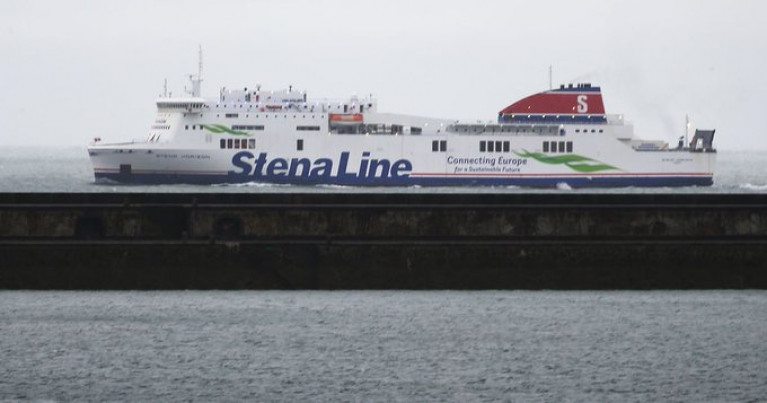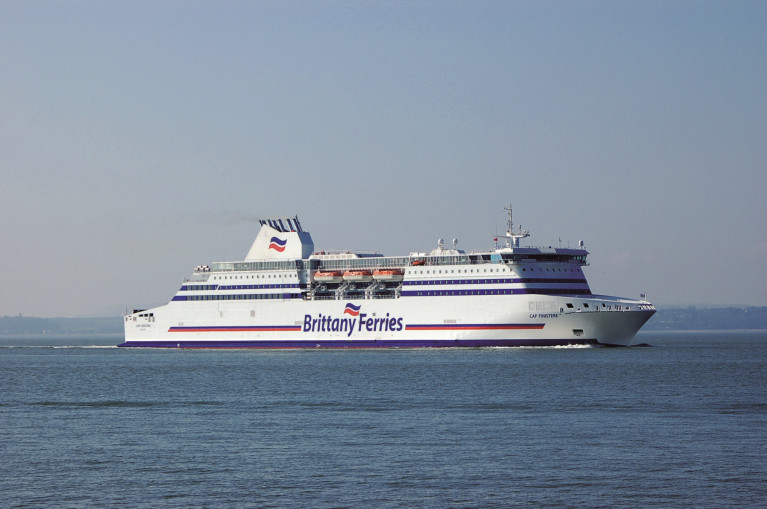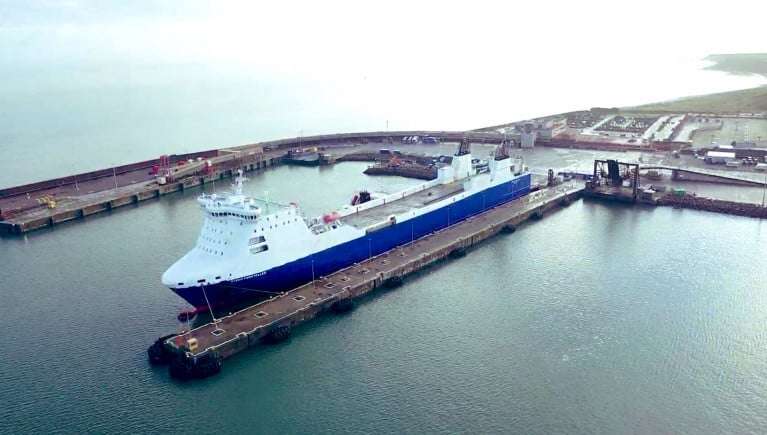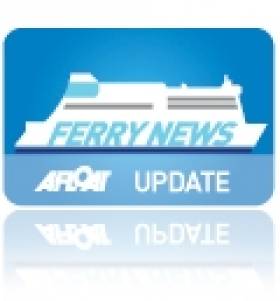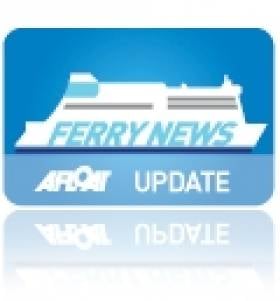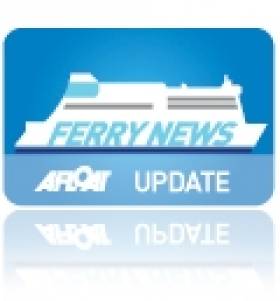Displaying items by tag: RosslareCherbourg
Stena Horizon, which recently left Stena Line’s newly opened freight-only Dublin-Liverpool (Birkenhead) route for annual dry-docking, had completed a previous career on this date a decade ago with an Irish ferry company, writes Jehan Ashmore.
Operating albeit in freight mode, the 27,522-tonne Stena Horizon in mid-February launched the Ireland-England corridor route following P&O Ferries’ withdrawal of their service last year but was based out of Liverpool docks. The 186.5-metre ropax, however, was only a temporary measure until a more suitable dedicated freight ship could be sourced, which led to the MV Bore Song, which Stena has secured as the route’s permanent vessel, but not until it enters in mid-April.
In the meantime, as Stena Horizon is dry-docked at A&P Falmouth, Cornwall, a fleetmate ropax, Stena Nordica (which has yet to return to Rosslare-Fishguard; see story), took over the Liffey-Merseyside route. This releasing the Cantiere Navale di Visentini shipyard in Italy built Stena Line ropax, which previously named Celtic Horizon, on 31 March, 2014, Afloat reported of it completing a final ever round trip on the Rosslare-Cherbourg route for Celtic Link Ferries, based out of the ‘Europort’ in Co. Wexford.
This end-of-an era English Channel / Celtic Sea crossing of Celtic Horizon was under the command of Captain Richard Collins and his 50 crew (see related: 'A View from the Bridge' having previously interviewed for ‘Ships Monthly’ and printed in the February issue the year before.
On that final day in March, a decade ago, when disembarking as a foot passenger, a senior Celtic Link Ferries official informed me that the paperwork to transfer the business was been finalised with Stena Line. The large Swedish company that was acquiring the Irish company would then commence operations the next day, 1 April.
The origins of Celtic Link Ferries are local, as the owners, the O’Flaherty Brothers, have a large trawler fleet and the Saltees Fish processing plant in Kilmore Quay. However, when the Ireland-France route’s previous operator, P&O Ferries, announced its closure in 2004, this posed a major challenge in their supply chain to exporting fish products to markets, particularly in France, Spain, and Italy.
At that time, Rosslare Europort did not have the choice and frequency of services (with only Irish Ferries) to mainland Europe, as experienced currently with the Brexit-bypass boom, so this led the O’Flaherty Brothers and investors to acquire the P&O route along with their ro-ro freight ferry, European Diplomat, which was simply renamed Diplomat for the new operator, Celtic Link Ferries. The fledging company in 2005 reinstated the passenger/freight link but would also add, over the years, freight-only routes on the central Irish Sea and English Channel using chartered tonnage.
The 1978-built Diplomat with limited passenger facilities was ageing and was replaced in the form of another Visentini-built ropax, the Norman Voyager, which was sub-chartered from LD Lines. The French ferry subsidiary of Louis Dreyfus had originally operated on their Rosslare-Le Havre route after a long absence from when Irish Ferries served this route.
With the passage of time, Norman Voyager headed off service for a career with Brittany Ferries, which ultimately led to the third and final ferry of the company, Celtic Horizon, on a five-year charter from the Italian shipyard owners to Celtic Link. The ropax entered service in 2011 and became the first and only vessel during the ferry company’s’ history to be given a name reflecting its brand name and also to be displayed on the funnel, as the previous vessels just had the initials ‘C L’.
The Italian flagged vessel with the Adriatic port of Bari as its registry is retained with Stena, which, following its transfer of the ‘no frills’ ropax, received an overhaul and refurbishment upgrade to bring the ferry to higher standards as expected by the large operator. This was the first time for Stena to have a route between Ireland and mainland Europe, complementing its network on the Irish Sea, the North Sea, and Scandinavia.
Last weekend Stena Horizon arrived at the A&P Falmouth and is to remain in dry dock until resuming Rosslare-Cherbourg service on 9 April, re-joining Stena Vision. The much larger cruise-ferry, which has exclusively spent a career solely in Scandinavia and the Baltic Sea since being built in 1987, made its debut on the French connection less than a year ago.
Since its introduction in June, the cruise ferry has considerably boosted business, having attracted customers and given its extensive range of facilities and cabin choices compared to the ropax.
Sailings Cancelled on Brittany Ferries Rosslare-Cherbourg Service to Have Involved Final ‘Normandie’ Crossings
Today’s night-time Brittany Ferries sailing on the Rosslare-Cherbourg service is cancelled, this was to have been the third and final France-Ireland weekend roundtrip operated notably by Normandie in a relief role, writes Jehan Ashmore.
The operator’s website sailing update does not outline as to why this weekend’s crossings are cancelled, though the forecast is of a Status Yellow - Gale warning for all Irish coastal waters and the Irish Sea, with south to southwest winds to reach gale force 8 at times.
In addition as of Sunday, is the arrival of Storm Isha which has been issued with a Status Orange warning, and is set to bring very strong winds coupled with damaging gusts over the next few days.
The reason for the use of the English Channel serving cruiseferry Normandie that runs Portsmouth-Oustreham (Caen) was due to a major engine issue of the Ireland-France route’s ropax, Cotentin which is currently undergoing repair in Brittany.
It was on Saturday, 6 January, when Afloat during routine tracking noted with much surprise the Normandie in Rosslare Europort, as seen above, on the cruiseferry’s first ever time to an Irish port.
The unexpected inaugural call was forced, as Normandie had to be deployment so to stand in for the Cotentin. This led the ropax to head for the repairs in Brittany with an arrival to Damen Shiprepair Brest (DSB), where the facility features several quays (with the ropax alongside) and three dry docks, the largest being 420 x 80m, is one of the biggest in Europe.
Cotentin which has been the route’s main ship of the last two years, has been supported with other ferries of the E-Flexer class cruiseferries chartered from Stena.
Occasionally, the freight-orientated vessel built for Brittany Ferries in Finland, has operated just on the English Channel leaving the Irish route to a single-ship service, but also at times operating from France to both Ireland and England on a rotational basis. Either way this is in competition on the Ireland-France route as Stena Line also operates a service.
Next week’s sailing schedules, sees Brittany Ferries second introduced E-Flexer, Salamanca operating the service and the return of Cotentin, should this all go according to plan.
Stena Line Achieves Record Summer Volumes on Ireland-France Route of Rosslare-Cherbourg
Ferry operator Stena Line has just recorded its busiest summer on their Ireland-France route with passenger and car numbers up over 90% on last year.
The introduction of Stena Vision on the Rosslare-Cherbourg service in June has helped to drive passenger volumes, but the Irish Sea’s largest ferry operator believes the figures also pay testimony to the increasing popularity of France as a destination of choice for the Irish market.
Paul Grant, Stena Line’s Trade Director (Irish Sea) said: “Even before the pandemic the popularity of the Rosslare-Cherbourg service was growing so we were always confident that adding an extra vessel to the route would prove popular with new as well as existing customers. The Stena Vision has helped Stena Line extend our customer service offering in terms of capacity and the range of facilities available onboard. With two ships operating on the route, this is now the most frequent service from Ireland to France offering six sailings each way per week.”
The addition of Stena Vision to the Ireland-France route provided Stena Line with a significant increase in capacity operating alongside Stena Horizon.
Stena Vision has space for 1,300 passengers, with 485 passenger cabins, more than any other ferry currently sailing from Ireland. It offers a wide selection of accommodation ranging from standard cabins to deluxe suites, as well as 42 pet friendly cabins.
The cruise ferry is also equipped with a choice of restaurants, Sky Bar with live entertainment, outdoor sun deck bar and Happy World kids play area. Guests can also avail of a Pure Nordic Spa which includes a sauna and jacuzzi.
Paul Grant added: “The introduction of Stena Vision has also been positive for the freight sector, which has seen demand grow for direct services to France since Brexit. Stena Vision has also increased driver accompanied capacity with more single occupancy cabin space for freight drivers.”
Stena Line is the largest ferry operator on the Irish Sea, with the biggest fleet, up to 238 weekly sailings offering the widest choice of routes including, combined passenger and freight services from Belfast to Cairnryan and Liverpool, Dublin to Holyhead, and Rosslare to Fishguard in addition to Rosslare to Cherbourg.
The company also runs a dedicated freight only route from Belfast to Heysham.
Stena Line's Euro-Vision Cruiseferry Departs Poland for Ireland to Operate Rosslare – Cherbourg Service
Stena Line’s latest addition to its expanding Irish Sea ferry fleet, Stena Vision, has departed a shipyard in Gdansk, Poland following a major refit investment programme and is bound for Rosslare Europort.
The 39,178 gross tonnage cruise ferry for the Ireland-France route as previously reported is due to go into service on the Rosslare-Cherbourg route on 30th June.
Stena Vision is the company’s additional cruise ferry on the Rosslare to Cherbourg service, where it will operate alongside the Stena Horizon. The second ship will increase service frequency on the route to six departure days providing 12 sailings per week, the most frequent ferry service between Ireland and the European Continent.
Paul Grant, Trade Director Stena Line said: “We are delighted to confirm that Stena Vision has now started on its journey to Rosslare. The ship has undergone a major refit investment and we are in the process of finalising last minute preparations in advance of commencing services on Rosslare-Cherbourg on 30th June, just in time for the peak summer holiday period.”
 Stena Vision – The 39,178 gross tonnage cruise ferry for the Ireland-France route is due to go into service on the Rosslare-Cherbourg route on 30th June
Stena Vision – The 39,178 gross tonnage cruise ferry for the Ireland-France route is due to go into service on the Rosslare-Cherbourg route on 30th June
The addition of Stena Vision to the Ireland-France route, will provide Stena Line with a significant increase in capacity operating alongside Stena Horizon. Stena Vision will have space for 1,300 passengers and 485 passenger cabins, more than any other ferry currently sailing from Ireland. It will offer a wide selection of accommodation ranging from standard cabins to deluxe suites and also offers 42 pet friendly cabins.
Paul Grant added: “The introduction of Stena Vision is also welcome news for the freight sector, which has seen demand grow for direct services to France for hauliers since Brexit. Stena Vision will also increase driver accompanied capacity with more cabin space for freight drivers.”
Stena Line routes including, combined passenger and freight services from Belfast to Cairnryan and Liverpool, Dublin to Holyhead, and Rosslare to Fishguard routes. In addition to a dedicated freight only route from Belfast to Heysham with a total of up to 238 weekly sailing options between Britain and Ireland.
Afloat has noted Stena Line's new Dublin-Cherbourg route launched in January, has not been operating on a regular basis by the inaugural 'E-Flexer' class ferry, in particular to sailings last month, writes Jehan Ashmore.
The operator's first route connecting the capital and mainland Europe began operations using the E-Flexer Stena Estrid, redeployed from the Dublin-Holyhead, where traffic so far this year is down due to post-Brexit.
The larger leadship E-Flexer ropax made a debut on the Ireland-Wales route in early 2020, just months before Covid-19 struck and subsequent first Irish lock-down that took place almost a year ago.
Another ropax, Stena Horizon having served this winter as Irish Sea relief ferry to cover overhaul of fleetmates, has recently taken up Dublin-Cherbourg duties, but otherwise normally operates Rosslare-Cherbourg.
But before Stena Horizon's debut on the Dublin-mainland Europe service, Stena Estrid had been running out of Rosslare to France, joining January's introduction of ro-ro freighter Stena Foreteller. This in an effort to boost capacity to meet surging demand from freight hauliers to bypass Brexit.
So why the change of ropax vessel serving the Dublin-Cherbourg route?, this led Afloat to seek a response from Stena Line below.
“Due to trade distortions on the Irish Sea caused by Brexit, Stena Line requires one of its E-Flexer vessels on the Rosslare-Cherbourg route due to the high demand from drivers for cabins on the ‘direct route’ and the other E-Flexers are required to cover similar demands into Belfast".
"The weekend service from Dublin-Cherbourg is covered by the vessel operating on Dublin-Holyhead, which is currently Stena Horizon, part of a more flexible fleet strategy employed by Stena Line where vessels are moved in line with current demand requirements".
Stena also added that "Demand remains strong on Dublin-Cherbourg and Stena Horizon is more than capable of handling the current demand but as always Stena Line will closely monitor traffic flows to ensure its fleet deployment is aligned for optimum efficiency.”
As of this afternoon, Stena Horizon is in Dublin Port prior to running week-day operations to Holyhead. While berthed at Rosslare Europort is Stena Foreteller and at the English Channel port of Cherbourg is where Stena Estrid is berthed.
Brittany Ferries Add New Rosslare-Cherbourg Service Bringing More Capacity & Much Earlier
Hot on the heals of Stena Line's new Dublin-Cherbourg route announced today, Brittany Ferries has also acted quickly to support the freight sector and meet the needs of an industry battling Brexit by confirming a new weekly Rosslare-Cherbourg service.
As Afloat reported back in July, this new Ireland-France service which was due to commence in March, will begin service on Monday, 18 January 2021. This new service will initially be served by the Cap Finistère.
Afloat adds Stena Line increased freight space with the brand new Stena Embla but on the Rosslare-Cherbourg route with the ferry completing a first round trip today. This follows Irish Ferries which only last week deployed W.B.Yeats onto the Dublin-Cherbourg route but much earlier so to alleviate pressing freight concerns over capacity.
As Brittany Ferries highlight, Irish and French hauliers have traditionally relied on the UK-land bridge when transporting goods to and from mainland Europe. However, since the beginning of the year, more companies have sought an alternative to the additional administration, new formalities, greater costs and potential delays that come from carrying goods though the UK.
Therefore, the French operator confirms today that Cap Finistère will cover the twice weekly sailing connecting Rosslare and Bilbao, taking over from Connemara until 10 February. As a consequence of this ship’s flexibility, Brittany Ferries will also add a weekly rotation connecting Rosslare with Cherbourg to the schedule, opening this Ireland-France route two months earlier than originally planned.
“Brittany Ferries prides itself on decisive action, based on the flexibility of its fleet and we can meet the needs of the marketplace quickly,” said Christophe Mathieu, Brittany Ferries CEO. “Cap Finistère is our fastest Ro-Ro vessel and she is therefore well suited to opening this new Brexit by-pass, making an additional sailing each week connecting France and Ireland.”
Glenn Carr, General Manager, Rosslare Europort said “all at Rosslare Europort welcome Brittany Ferries’ swift response to the needs of Irish industry in commencing this year’s Rosslare to Cherbourg services two months earlier than planned. We have worked closely with Brittany Ferries in ensuring that arrangements for the service were quickly put in place, further cementing Rosslare Europort’s position as Ireland’s Gateway to Europe.”
Two Stena ferries will sail on Tuesday to alleviate the pressure on Irish transport companies and add capacity to direct routes to mainland Europe.
Shipping operator Stena Line is adding a second ferry on its direct route between Ireland and France from Tuesday to allow hauliers avoid Britain and Covid-related travel restrictions.
The company said it would be bringing forward plans to double the capacity and frequency of its direct sailings by two weeks from an original planned January 4th start date to cope with demand for post-Brexit freight traffic.
For more The Irish Times reports.
As Afloat previously reported DFDS on 2nd January is to launch a new freight-only route of Rosslare- Dunkirk, northern France served by three ships. They are DFDS Optima Seaways and a pair of chartered ferries, Visby from Baltic Sea operations and Kerry that previously served Brittany Ferries.
The French operator already provides sailings to Bilbao in northern Spain from where ropax Connemara (replaced Kerry last month) was tracked by Afloat.ie to arrive in the Wexford ferryport this afternoon.
In efforts to alleviate the UK land-bridge, Brittany Ferries on 22 March is to open a new Rosslare-Cherbourg service in direct competition with Stena Line.
French Route Ferry Expected to Re-Enter Service Today
#FerryReturns – Irish Ferries French route cruiseferry, Oscar Wilde, which had to cancel sailings due to a technical fault involving the radar, is expected to resume service with today's night-time sailing departing from Cherbourg to Rosslare.
As previously reported, the cruiseferry Oscar Wilde (1987/31,914 tonnes), was due to have departed Cherbourg on Tuesday, however she has remained since then in the French port. As a result this also led to the cancellation of a round trip crossing from Ireland which was scheduled to arrive to Cherbourg this afternoon.
Tonight's sailing from Cherbourg is scheduled to depart at 21.30 local time and arrive in Rosslare Harbour tomorrow afternoon at 15.30hrs. For the latest information on sailings updates and contact details from ports, visit this link from Irish Ferries website.
Celtic Link Ferries See Increase in May Traffic
#FerryNews – Celtic Link Ferries have recorded an increase in both passenger and vehicle traffic for the month of May.
Passengers making southbound Rosslare-Cherbourg sailings have increased by a modest 1.5% for the month compared to the same time last year. In the opposite direction, passenger making sailings to Ireland have increased by more than 14%.
"May figures have been very encouraging" said Rory McCall, Tourist Passenger Manager. "There is a strong desire still for people to go on holidays- our business has grown, simply because we have the best value rates".
The operator which runs ro-pax Celtic Horizon on the thrice weekly round trip service, has seen growth in all types of vehicle traffic that includes not just cars but campervans, motorcycles and coaches.
#FrenchFerry– As summertime officially starts over the Easter Weekend, perhaps it's also time to set a sailing time of your choice by booking with Celtic Link Ferries, noting the half-price cabin sale!
The operator which runs the ro-pax ferry Celtic Horizon on the thrice weekly Rosslare-Cherbourg route has launched the half price cabin sale and where there's a selection of accommodation ranging from 2-berth, 4-berth and 6-berth cabins plus luxurious suites.
For further information and to make a booking visit: www.celticlinkferries.com




























